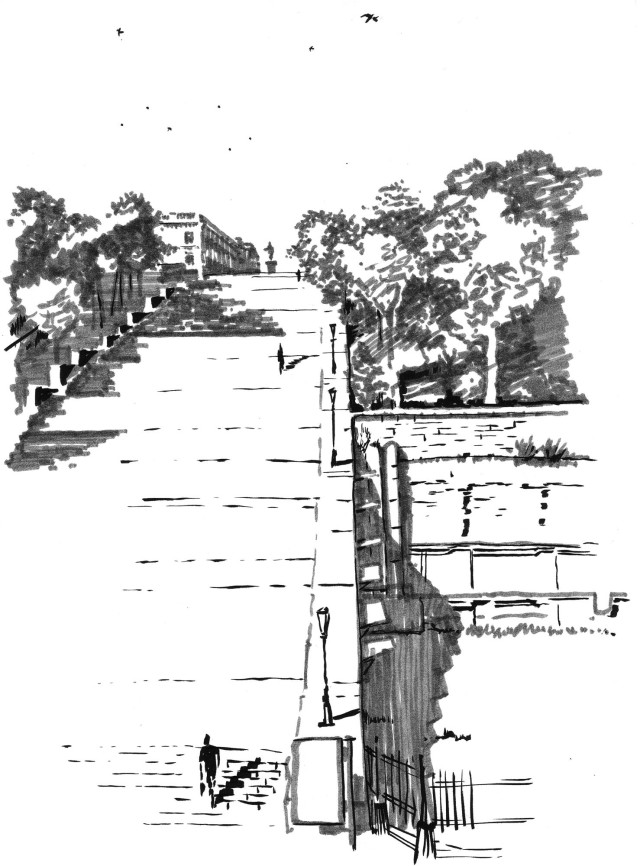Ernest Hemingway’s famous observation in his memoir ‘A Movable Feast’’, in which he describes Paris as “the place best organized for a writer to write in” can be just as easily applied to Odessa. The atmosphere of the town is liberal, the people are open, the temperature is pleasant, the tempo of life is relaxed and measured. Like Paris, the city has equal parts creative fervency and genetic cultural understanding of living well. The dazzling architecture will lift the soul and the breeze coming in from the Black Sea will sooth it in it’s flight. The city has a gorgeous library – one of the oldest in the country – it is where Maxim Gorky spent his afternoons reading bent over a lamp. There are also any number of cafes with views of cobblestone lined streets or the sea. Places where one can spend hours sipping coffee or something stronger while pouring through a manuscript or thumbing a novel. It is in short, a fantastic place to write, to be a writer and from which to observe the rhythms of everyday life.
Thus, it should come as no surprise that throughout it’s storied history, Odessa has always been a center of literary production. It is a place that has nurtured generations of talented writers with the manna of their physical and spiritual needs. Hundreds of well known writers have come from the city or passed through it on the way to greater (and very often smaller) things. These have included scribes who wrote in any of multitudinous languages spoken in Odessa. Greek, Russian, Yiddish, Polish, Ukrainian, Bulgarian and German language literature have been composed in Odessa. It is arguably the birthplace of several nations literatures (Greek, Bulgarian and Jewish most importantly) and the incubator of many others.
The city has a gorgeous library – one of the oldest in the country – it is where Maxim Gorky spent his afternoons reading bent over a lamp.
Being at the cross roads of imperial and national trade routes on the Black Sea, and also being the naval portal into the Russian empire through which people entered and left Europe made the city a cosmopolitan place. It is a seaside city whose literary character was buttressed by the constant waves of travelers who washed up on it’s shores (in this, the city unambiguously recalls Venice, that other most serene maritime republic).
Naturally, all these elements add up to a surefire recipe for creative ferment. Odessa was not unlike the New York City or Hong Kong of the 19th century Russian empire. As a teenager, the young Giuseppe Garibaldi alighted in the harbor, as did many of the most remarkable characters of the epoch. The climate and intellectual soil of the city was always fruitful for the development of nonconformist personalities.
This portfolio does not makes any claims to being encyclopedic and excludes as many noteworthy characters as it includes. We are deliberately not dealing with the legions of Russian or Ukrainian (that is ‘domestic’) literary travelers who flocked here from all across the empire in order to call the city their home for at least a little while. Anton Chekhov, for example, plays an important role in that history, and the city plays an important role in the biography of his life. Yet that is a story for another time. Likewise, as a young civil servant, Russia’s national poet Alexander Pushkin also spent more than a year in Odessa – enjoying every second immensely – and wrote several chapters of his canonical masterpiece ‘Eugene Onegin’ in the city. The details of Pushkin’s sojourn are universally known to literate Russians and visitors to the city (and if they are not, one can just visit the museum dedicated to him). Most everyone also knows that he spent his time in the city mostly drinking and going to parties. That his counterpart, the national poet of Poland, Adam Mickiewicz, also enjoyed a similarly dissolute youth in Odessa, is not as widely known. The role of Odessa in the development of Mickiewicz’s artistry is fascinating and in some ways typical.
Mark Twain also passed through here on a decommissioned confederate steamship on the way to the holy land. All he saw was America. That is to say he liked what he saw as a tourist, and he wrote about the city in glowing terms in his youthful journalism. An excerpt from his travel writing is included in this portfolio.
The very subtle Canadian novelist and translator Soren Gauger has written a tremendously witty and insightful essay about the peregrinations of that most peripatetic and eccentric of nineteenth century British travelers: Laurence Oliphant. To compliment Gauger’s somewhat baffled ruminations over the work of this oddball weirdo who wrote the most bland prose possible, we are also publishing an excerpt from Oliphant’s travel writing. Though the case of Oliphant is doubtless amusing, and surely exceptional, it demonstrates the fact that not everyone loved it in Odessa. Or traveling in general. Oliphant was the most perverse sort of travel writer: the kind who hated to travel and who compared every place he visited to comforts of home. Still, there are as many different sorts of travel writing as there are kinds of travelers, but all collected here had the indelible impression of the city stampted deeply in their work.




































